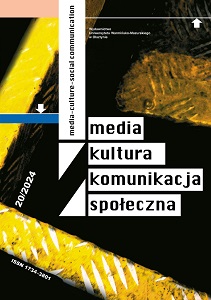Krajobraz Donbasu i jego znaczenia w filmie Atlantyda Walentyna Wasjanowicza
The Donbass landscape and its symbolism in the film Atlantis by Valentin Vasyanovich
Author(s): Tomasz AdamskiSubject(s): Geography, Regional studies, Regional Geography, Film / Cinema / Cinematography
Published by: Wydawnictwo Uniwersytetu Warmińsko-Mazurskiego w Olsztynie
Keywords: film; Donbas; Ukraine; negative aesthetics; landscape;
Summary/Abstract: This article analyses the landscape of Donbas appearing in the film Atlantis (2019), directed by Valentin Vasyanovich. The author of the article draws attention to the topographical possibilities of reading this film in the context of the negative aesthetics of Arnold Berleant. He also highlights how the devastated landscape of Donbas and the psyche of the main character (Sergei), who is struggling with PTSD syndrome and post- -war trauma, correspond to each other. Sergei, in order to undergo a transformation, has to change himself, but he also has to change his attitude toward the landscape, which, after the main character’s transformation, will become a sight to him and not (as before) the neighbourhood within which he carried out his activities. The post-industrial landscape will also change, which, following Anna Storm, is referred to as a post-industrial scar, which refers not only to the past but also has a healing character.
Journal: Media – Kultura – Komunikacja Społeczna
- Issue Year: 20/2024
- Issue No: 1
- Page Range: 171-181
- Page Count: 11
- Language: Polish

